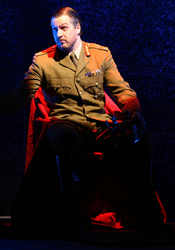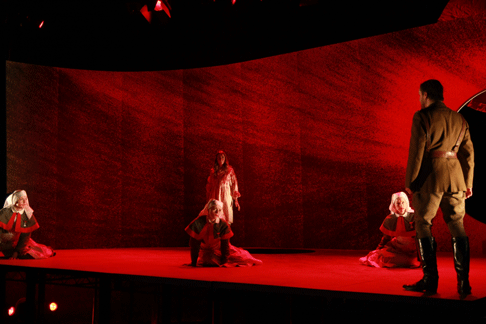![Katherine Rohrer as Lady Macbeth [Photo by Dan Swerdlow]](http://www.operatoday.com/Lady_Macbeth.gif)
30 Mar 2009
Bloch’s Macbeth by UC Opera, London
Mention Macbeth — The Opera and most think of Verdi. Ernest Bloch took on the subject more than half a century later, in Paris in 1910, when Verdi’s version was almost as obscure as Bloch’s is today.
English Touring Opera are delighted to announce a season of lyric monodramas to tour nationally from October to December. The season features music for solo singer and piano by Argento, Britten, Tippett and Shostakovich with a bold and inventive approach to making opera during social distancing.
This tenth of ten Live from London concerts was in fact a recorded live performance from California. It was no less enjoyable for that, and it was also uplifting to learn that this wasn’t in fact the ‘last’ LfL event that we will be able to enjoy, courtesy of VOCES8 and their fellow vocal ensembles (more below …).
Ever since Wigmore Hall announced their superb series of autumn concerts, all streamed live and available free of charge, I’d been looking forward to this song recital by Ian Bostridge and Imogen Cooper.
The Sixteen continues its exploration of Henry Purcell’s Welcome Songs for Charles II. As with Robert King’s pioneering Purcell series begun over thirty years ago for Hyperion, Harry Christophers is recording two Welcome Songs per disc.
Although Stile Antico’s programme article for their Live from London recital introduced their selection from the many treasures of the English Renaissance in the context of the theological debates and upheavals of the Tudor and Elizabethan years, their performance was more evocative of private chamber music than of public liturgy.
In February this year, Albanian soprano Ermonela Jaho made a highly lauded debut recital at Wigmore Hall - a concert which both celebrated Opera Rara’s 50th anniversary and honoured the career of the Italian soprano Rosina Storchio (1872-1945), the star of verismo who created the title roles in Leoncavallo’s La bohème and Zazà, Mascagni’s Lodoletta and Puccini’s Madama Butterfly.
Evidently, face masks don’t stifle appreciative “Bravo!”s. And, reducing audience numbers doesn’t lower the volume of such acclamations. For, the audience at Wigmore Hall gave soprano Elizabeth Llewellyn and pianist Simon Lepper a greatly deserved warm reception and hearty response following this lunchtime recital of late-Romantic song.
Collapsology. Or, perhaps we should use the French word ‘Collapsologie’ because this is a transdisciplinary idea pretty much advocated by a series of French theorists - and apparently, mostly French theorists. It in essence focuses on the imminent collapse of modern society and all its layers - a series of escalating crises on a global scale: environmental, economic, geopolitical, governmental; the list is extensive.
For this week’s Live from London vocal recital we moved from the home of VOCES8, St Anne and St Agnes in the City of London, to Kings Place, where The Sixteen - who have been associate artists at the venue for some time - presented a programme of music and words bound together by the theme of ‘reflection’.
'Such is your divine Disposation that both you excellently understand, and royally entertaine the Exercise of Musicke.’
Amongst an avalanche of new Mahler recordings appearing at the moment (Das Lied von der Erde seems to be the most favoured, with three) this 1991 Mahler Second from the 2nd Kassel MahlerFest is one of the more interesting releases.
‘And there was war in heaven: Michael and his angels fought against the dragon; and the dragon fought and his angels, And prevailed not; neither was their place found any more in heaven … that old serpent … Satan, which deceiveth the whole world: he was cast out into the earth, and his angels were cast out with him.’
If there is one myth, it seems believed by some people today, that probably needs shattering it is that post-war recordings or performances of Wagner operas were always of exceptional quality. This 1949 Hamburg Tristan und Isolde is one of those recordings - though quite who is to blame for its many problems takes quite some unearthing.
There was never any doubt that the fifth of the twelve Met Stars Live in Concert broadcasts was going to be a palpably intense and vivid event, as well as a musically stunning and theatrically enervating experience.
‘Love’ was the theme for this Live from London performance by Apollo5. Given the complexity and diversity of that human emotion, and Apollo5’s reputation for versatility and diverse repertoire, ranging from Renaissance choral music to jazz, from contemporary classical works to popular song, it was no surprise that their programme spanned 500 years and several musical styles.
The Academy of St Martin in the Fields have titled their autumn series of eight concerts - which are taking place at 5pm and 7.30pm on two Saturdays each month at their home venue in Trafalgar Square, and being filmed for streaming the following Thursday - ‘re:connect’.
The London Symphony Orchestra opened their Autumn 2020 season with a homage to Oliver Knussen, who died at the age of 66 in July 2018. The programme traced a national musical lineage through the twentieth century, from Britten to Knussen, on to Mark-Anthony Turnage, and entwining the LSO and Rattle too.
With the Live from London digital vocal festival entering the second half of the series, the festival’s host, VOCES8, returned to their home at St Annes and St Agnes in the City of London to present a sequence of ‘Choral Dances’ - vocal music inspired by dance, embracing diverse genres from the Renaissance madrigal to swing jazz.
Just a few unison string wriggles from the opening of Mozart’s overture to Le nozze di Figaro are enough to make any opera-lover perch on the edge of their seat, in excited anticipation of the drama in music to come, so there could be no other curtain-raiser for this Gala Concert at the Royal Opera House, the latest instalment from ‘their House’ to ‘our houses’.
"Before the ending of the day, creator of all things, we pray that, with your accustomed mercy, you may watch over us."
![Katherine Rohrer as Lady Macbeth [Photo by Dan Swerdlow]](http://www.operatoday.com/Lady_Macbeth.gif)
Mention Macbeth — The Opera and most think of Verdi. Ernest Bloch took on the subject more than half a century later, in Paris in 1910, when Verdi’s version was almost as obscure as Bloch’s is today.
Originally the opera was composed to a French libretto by Edmond Fleg, but Bloch revisited the piece forty years later and adapted it to an English libretto, much of it Shakespeare’s own text. The French version of Bloch’s opera had its UK concert premiere in 1975 at the Royal Festival Hall, but it has never been performed here in the English version, nor in a fully staged production. Not, that is, until UC Opera — that champion of neglected masterpieces and justly forgotten flops alike — took it upon themselves to rectify the omission from the repertoire.
 George von Bergen as Macbeth
George von Bergen as Macbeth
This is an opera which concentrates on private moments, monologues and
dialogues; the sleepwalking scene is a private nightmare, without the usual
pair of onlookers. Far more of the play’s soliloquys survive than in the
libretto Piave wrote for Verdi; even the Drunken Porter makes an appearance,
with the opera’s one straightforward strophic song; a contrast in
word-setting which reflects Shakespeare’s own switch from blank verse to
prose.
The score is primarily reminiscent of Debussy in its often rather nebulous drift through the text, but has shades of Salome and Götterdämmerung as well. The student orchestra (UCL has no music department) was problematic: in a woodwind-dominated score, the wind and brass playing was at best weak and at worst excruciating. In his one-monologue cameo as Duncan, the distinguished veteran tenor Ryland Davies sang with a expertly-crafted lyrical arch to his phrasing which showed up the accompanying instrumentalists as being flat as a pancake beneath. The string playing was better, the basses making a particularly strong atmospheric impression with the darkly throbbing pizzicato in the scene immediately after Duncan’s murder. Charles Peebles, conducting, shaped the orchestration and choral singing as best he could; the final rhythmically-driven chorus in which all are united against Macbeth comes as a refreshing climax.
Bloch changes the order of the later scenes (Shakespeare’s Acts 4 and 5) giving an alternative slant to the plot: it’s not until after the (apparently motiveless) slaughter of Macduff’s family that Macbeth seeks the witches a second time, and they reveal to him only the parade of kings and the Birnam Wood prophecy. The other two prophecies are cut, so Macbeth’s only reason to fear Macduff is that he will be seeking to avenge his wife and children. It takes the tautness out of the structure: this is a play in which bad things definitely come in threes.
 Scene from Act 3
Scene from Act 3
And indeed, director John Ramster makes good use of the Witches (student soloists Mimi Kroll, Jessica Blackstone and Ella Jackson). They hover over the battle-slain like malign Valkyries, and travel as tree-spirits with the avenging army to see the final part of their prophecy played out. It’s a very strong staging all round, with space and lighting always used effectively; Bridget Kimak’s set is presided over by a blood-red moon, which moves into a total eclipse at the denouement — a strong visual evocation of the coming together of all the fateful prophecies which have governed Macbeth’s bloody reign.
The (hired) major principals were also strong — considerably stronger, in fact, than most of UC Opera’s casting in recent years. George von Bergen was especially good in the title role, dominating his every scene with a strong stage presence and full, finely-nuanced baritone. The young American mezzo Katherine Rohrer (Glyndebourne on Tour’s recent Carmen) has a lightish, agile voice with an excellent top; her Lady Macbeth was elegant and fiery, the progress of her self-destruction visible in her face. Richard Rowe sang Banquo in an even, well-produced tenor (his murder takes place offstage). The bass-baritone Carl Gombrich (National Opera Studio trained, now on the administrative staff at UCL) was a soft-grained Macduff, needing a little more heft and edge when urging the household to awake and hear the news of Duncan’s murder. Of the student soloists, tenor Hal Brindley’s Malcolm was the stand-out performance.
Ruth Elleson © 2009